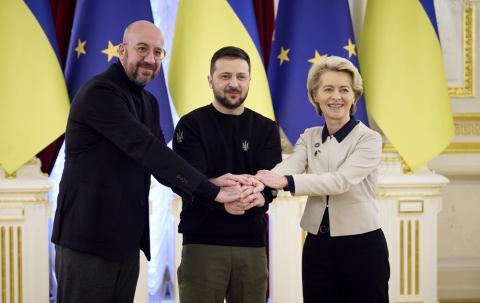
The European Union will look at hitting Belarus"s big potash exports as well as its oil and financial sectors with new sanctions, as punishment for forcing down a Ryanair flight to arrest a journalist, EU foreign ministers said.
European leaders have described Sunday"s incident, in which a flight between EU members Greece and Lithuania was pressed to land in Minsk and a 26-year-old exiled dissident and 23-year-old student were arrested, as state piracy. They have promised to impose serious consequences.
Foreign ministers gathering in the Portuguese capital on Thursday said they were looking at targeting sectors that play a central role in the Belarus economy, to inflict real punishment on President Alexander Lukashenko.
"The hijacking of the plane and the detention of the two passengers is completely unacceptable, and we will start discussing implementation of the sectorial and economic sanctions," EU foreign policy chief Josep Borrell told reporters in Lisbon.
Luxembourg Foreign Minister Jean Asselborn said: "The keyword, I think, is potash. We know that Belarus produces very much potash, it is one of the biggest suppliers globally, and I think it would hurt Lukashenko very much if we managed something in this area."
Lithuanian Foreign Minister Gabrielius Landsbergis said the EU should consider hitting the oil sector, while Germany"s Heiko Maas spoke of measures to target financial transactions, which diplomats said would probably involve preventing the EU from lending to Belarusian banks.
Maas said Belarusian bond sales could be targeted too.
"We are talking about using financing means ... particularly the question to what extent Belarus should be allowed in future to issue bonds, by the state or the central bank, in Europe," he told reporters.
Exports of potash - a potassium-rich salt used in fertilizer - are one of the major sources of foreign currency for Belarus, and state firm Belaruskali says it produces 20 percent of the world"s supply.
The EU statistics agency said the bloc imported 1.2 billion euros ($1.5 billion) worth of chemicals including potash from Belarus last year, as well as more than 1 billion euros worth of crude oil and related products such as fuel and lubricants.
So far this week, Europe has already moved to bar its airlines from using Belarus air space and to keep Belarusian planes out of its skies. But finding a package of sanctions that would change the behaviour of Lukashenko has proven difficult.
Since cracking down on pro-democracy protests last year, he largely ignored three previous rounds of EU sanctions and comparable U.S. measures, mainly blacklists that bar officials from travelling to or doing business in Europe and the United States.
Ministers in Lisbon said new sanctions would include a fourth round of travel bans and asset freezes. They are aiming for agreement on June 21 when they meet in Luxembourg.
Western countries are demanding free elections in Belarus. Germany"s Maas said sanctions should continue to be tightened, at least until more than 400 political prisoners there are released.
"As long as this is not the case, the EU cannot relent in paving the way for fresh sanctions," he said.
($1 = 0.8201 euros)












